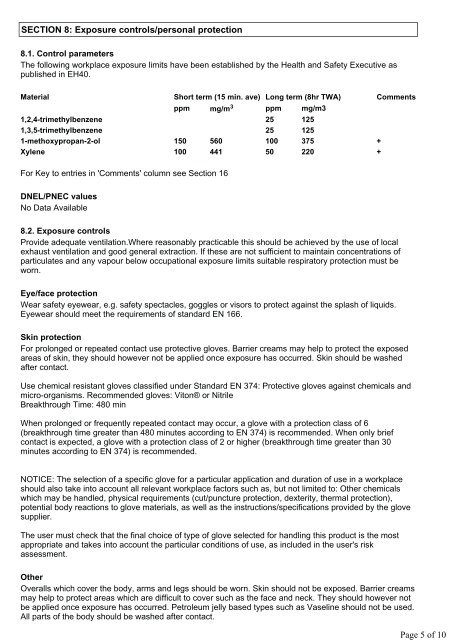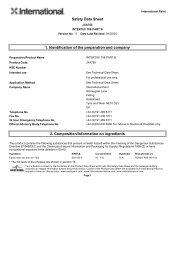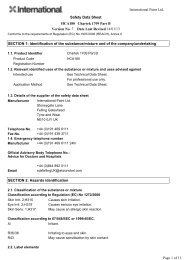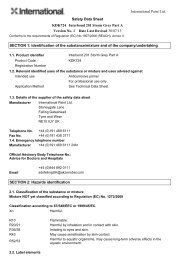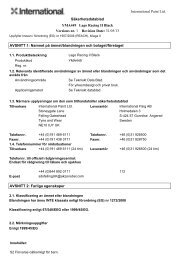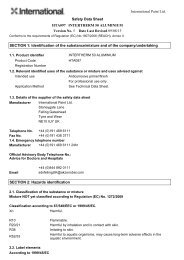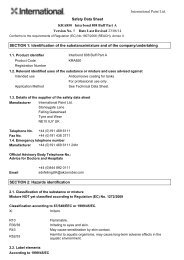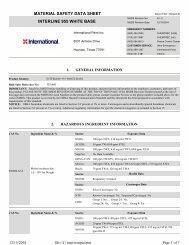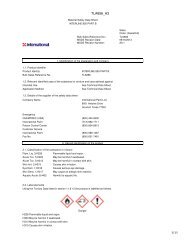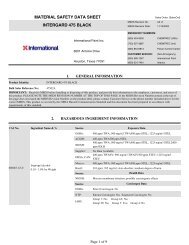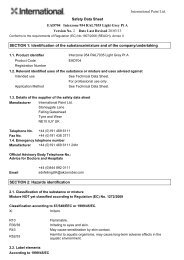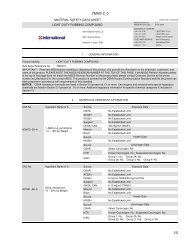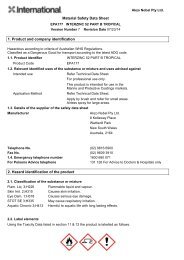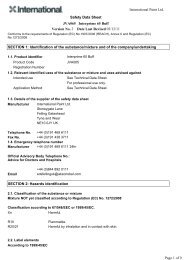International Paint Ltd. Safety Data Sheet EMB117 INTERGARD 410 ...
International Paint Ltd. Safety Data Sheet EMB117 INTERGARD 410 ...
International Paint Ltd. Safety Data Sheet EMB117 INTERGARD 410 ...
You also want an ePaper? Increase the reach of your titles
YUMPU automatically turns print PDFs into web optimized ePapers that Google loves.
IT? WAS IT MEGALOMANIA, DID HE HAVEDID SOMEBODY SET HIM UP TO DO IT?steadily built up. As Mr. Raju saidin his ‘confession’ letter, he wasriding a tiger which he couldn’t getoff, because he had built the story;and the more he built on it, the morehe had to do to keep it going.“This was a huge fraud in which,apparently, little or no money hadbeen taken out. Maybe that willcome out later, that money has gone,but we don’t know right now. Tillthe time I was there, we were notable to trace any money going intoMr. Raju’s or anyone else’s pocket.There might have been wheelswithin wheels, but nothing apparently.“It was just an accounting thing –high revenues, high profits, falsebank deposits – none of which existed.One of our jobs was to unravelthis. We got an accountingfirm... they are on the job even today;some people have been arrestedand jailed.”Finally, Mr. Karnik turned to the“Why?” of the whole story and saidthat it was still a great mystery tohim.He admitted that he knew Mr.Raju professionally from the timethat he (Mr. Karnik) enteredNasscom in 2002. Mr. Raju was theChairman of Nasscom which was arotating one-year position. He travelledextensively with Mr. Raju bothin the country and outside.Mr. Raju did a tremendousamount of social work, including thecreation of a state-of-the-art ambulanceservice called “108” which ranin many states, other thanMaharashtra. It was a very successfulventure. He had hired McKenzieto look at the metrics and it wasfound to be truly world-class. Heput a lot of money in it.In other words, Mr. Raju was asuccessful man who had a greatimage, who had built himself up;he was well known in the countryand even won a number ofawards for corporate governance,entrepreneurship and so on.He seemed to have his heart inthe right place and invested in socialcauses; he gave not trivial amountsbut huge sums of money for projectsthat did some very good work.“So why did he do this? I have noanswers. Maybe it was megalomania,maybe there was somethingwrong, maybe he had a Jekyll andHyde personality, or it may be thatsomebody set him up to do it.It was a huge fraud, no doubt. But there was no real money involved,says Mr. Kiran Karnik, former Nasscom chief. Till today, he does notknow whether anybody made any money. Nor is he sure whether themystery will ever be solved“But to me the ultimate fraud isthis, that the human character, inthe person you know, is not reallythere. If somebody had asked meon January 2 or 3, 2009, I can saytruthfully that I would have givenMr. Raju a character certificate.Now, suddenly, you lose confidencein your ability to assess a humanbeing. When you look at somebodywho’s doing good, it’s likely thatthis thought will be there at the backof your mind, that everything is notright.“The seed of doubt has beenplanted in your mind. And that, tome, is the biggest fraud. Can youtrust people? Suddenly, you will besaying, whom can you trust? Nobody.It’s very sad, but those of uswho knew him thought highly of himtill January 3 or 4.”Mr. Karnik took the opportunityto point out that even if one had thebest of systems in place (as didSatyam), even if rigorous reviewsand audits were conducted, even ifthere were eminent independent directorssitting on the board, therewas something else that was farmore important than all these puttogether. And that was a sense ofethics and values.“If there are no ethics and values,then all talk of good governance,systems and processes,checks and balances, work onlyup to a point. They are necessaryand they must be there, but theyare not enough, they are not sufficient.“Ethics and values must comeinto play. These should be (inculcated)early, from school, maybecollege, but certainly in places likebusiness schools; entry jobs in thecorporate world must emphasiseethics and values,” Mr. Karnik concluded.The first question was asked byAshwin Ramesh who wanted toknow how the competitors ofSatyam had behaved after the fraudwas discovered. Were they like vulturesor like friends?Mr. Karnik said that one of thefirst things Nasscom did was to arrangea teleconference of all theNasscom board members and to suggestthat they refrained from anypredatory action with regard to employees(trying to poach them) orcustomers. And apart from a few aberrations,the IT industry followedthe suggestion and showed restraint.The second question was posedby Mehul Sampat (which has beenreported extensively at the beginningof this report).And then it was the turn of PDGManibhai Doshi who asked aboutthe role played by Mr. DeepakParekh, an Honorary member of theRotary Club of Bombay, in rescuingSatyam.Mr. Karnik said he had not mentionedany individual names, but thefact remained that Mr. Parekh hadplayed a crucial role. There were sixmembers on the board and eachpulled his own weight, but Mr.Parekh was extremely helpful.“I was a retired man but Deepakhad a full-time operational job runninga huge corporation with greatresponsibility; yet, he was therewithout fail at every meeting in thefirst three or four months, adjustingto the others’ time, making sure hecame the previous evening, becausewe used to have an informal meetingfrom 10 to midnight. And he wasthere for every meeting. His contributionwas huge... it was a matter ofpride.”Finally, Sitaram Shah asked whenthe IT industry would become userfriendly for the common man. Hesaid that when someone got stuckwith something on a computer, serviceproviders were not available;one system never worked with another...and so on.Mr. Karnik said he shared the feelingof frustration for he had alsofaced the same problems. But computershad now become more userfriendly when compared to the situationa few years back. With time,they would become simpler, thanksto voice command, thanks to systemsthat would not break down frequentlyand so on.“You’ll reach a stage where youwon’t have to cope with the machine,but the machine will haveto cope with you. That’s the ultimate.We’re not there yet, ofcourse... but things are changingand ultimately we will get to thatpoint.“People like me have difficultycoping with the keyboard. I neverlearned typing so I keep searchingfor the keys. I have the same problemwith my Blackberry and someof the new smart phones. Qwertykeyboards are of no use to me becauseI don’t know where the lettersare located... an ABC keyboardmakes better sense for me. Butpeople are learning...“There is some good softwaresuch as voice-to-text. It’s a bit expensivebut it’s a great investmentfor someone who uses the computerfrequently; you can just read and itwill type; it’s self-learning and it getsused to your pronunciation. Theonly drawback is that it’s for a singleuser. It adjusts to your pronunciationand your (particular) speed. Ifyou buy one, your spouse and kidsmay not be able to use it,” Mr.Karnik added.The vote of thanks was proposedby Shailesh Haribhakti.August 17 to August 23, 2010 THE GATEWAY, The Bulletin of the Rotary Club of Bombay Page 5


